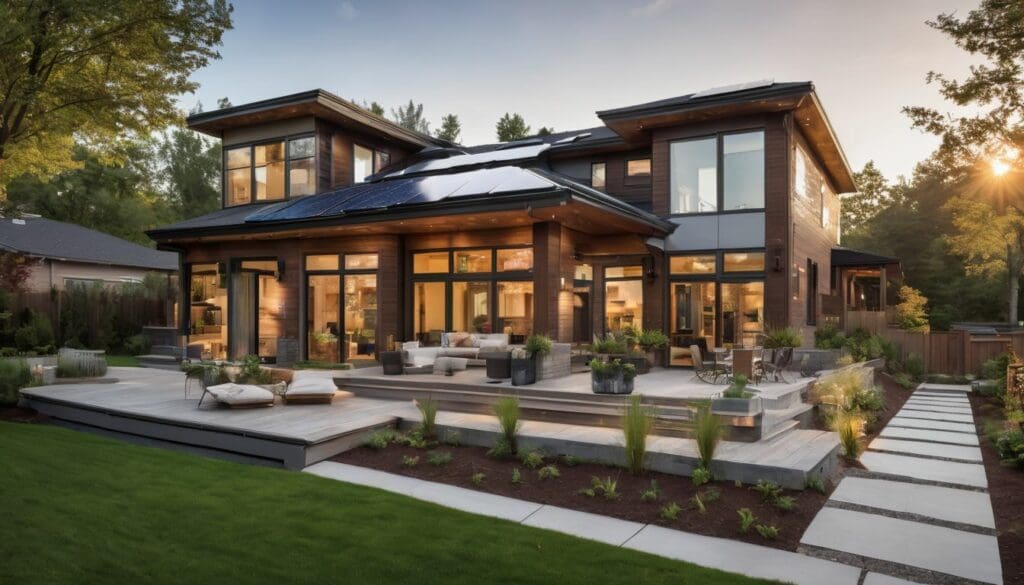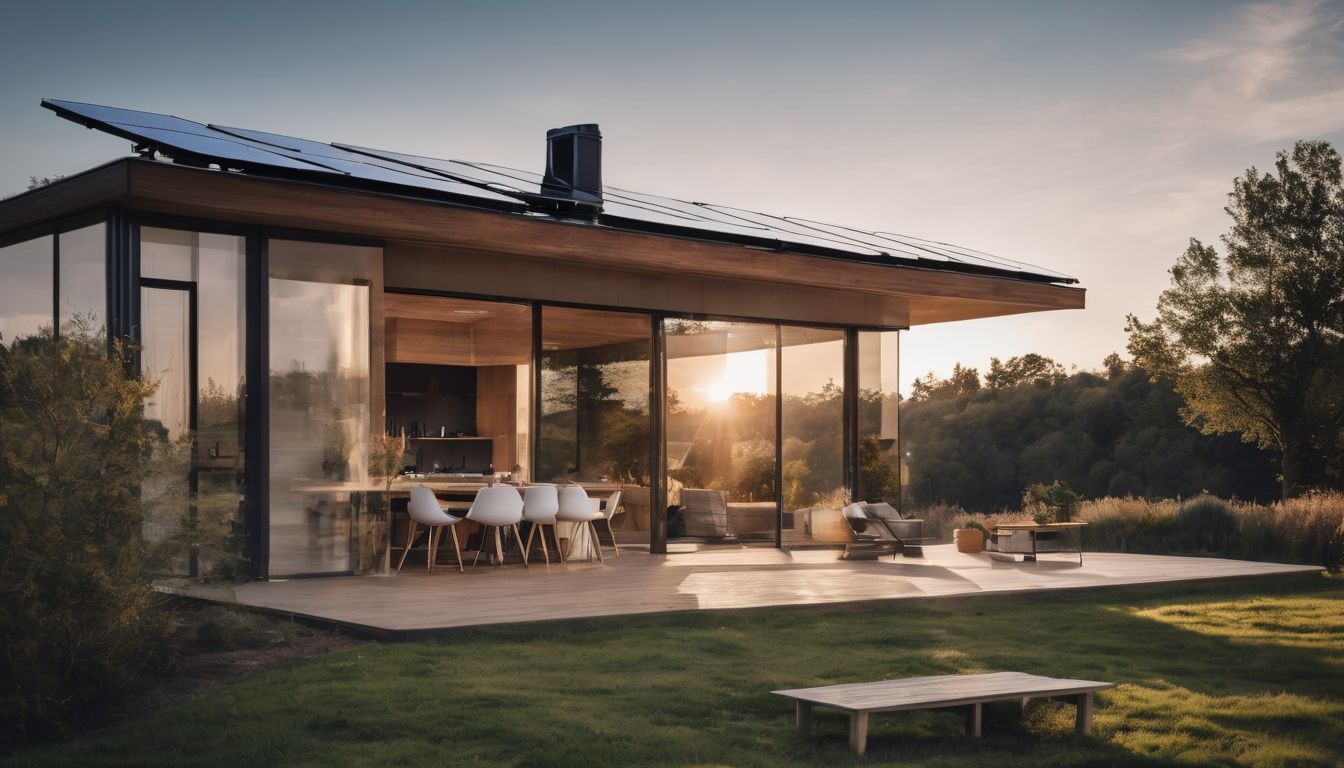Heating and cooling our homes can cost a lot and hurt the planet. Every year, many tonnes of CO2 get released from our home heaters and coolers. This guide will show you ways to keep warm or cool without harming Earth and save money too.
Let’s find out how!
Key Takeaways
- Eco – friendly HVAC systems reduce carbon footprint and benefit the environment by using renewable energy sources like geothermal, solar, or biomass.
- Businesses adopting green heating and cooling methods can save money thanks to lower energy bills and various financial incentives like tax credits or rebates.
- Energy – efficient HVAC options improve indoor air quality, creating healthier spaces for occupants while enhancing tenant satisfaction.
- Regular maintenance of eco – friendly heating and cooling systems ensures their efficiency, contributing to the longevity of the equipment and further cost savings.
- Choosing an eco – friendly HVAC system requires considering factors such as building design, location climate suitability, sustainability goals, maintenance needs, and regulatory compliance.
Understanding the Importance of Green Heating and Cooling
Green heating and cooling is crucial for environmental responsibility, cost savings, enhanced reputation, regulatory compliance, and improved indoor air quality. Making the switch to eco-friendly HVAC systems can have a significant impact on both the environment and your bottom line.
Environmental Responsibility
Environmental responsibility drives the shift toward eco-friendly heating and cooling solutions. By choosing systems that harness renewable energy sources, individuals and businesses significantly reduce their carbon footprint.
This commitment to sustainability not only combats climate change but also protects natural resources for future generations. Implementing green HVAC technology reflects a deep respect for our planet’s delicate ecosystems.
Eco-conscious climate control is at the forefront of responsible property management. Energy-efficient HVAC systems are designed to minimise waste, conserve energy, and utilise materials with lower environmental impacts.
From geothermal heating options to solar-powered air conditioning, these innovative approaches demonstrate how comfort and conservation can work hand in hand. Taking steps towards environmentally friendly temperature regulation represents a powerful move in building a greener future while staying true to conservation values.
Cost Savings
Switching to eco-friendly heating and cooling systems can lead to significant cost savings for businesses and homeowners. By utilising renewable energy sources like geothermal, solar, or biomass heating systems, you can reduce your reliance on traditional fuel sources, leading to lower energy bills.
Additionally, many governments offer financial incentives such as tax credits or rebates for adopting sustainable HVAC technology, helping offset initial installation costs. Furthermore, these eco-friendly systems often require less maintenance and have longer lifespans, cutting down on repair and replacement expenses in the long run.
Implementing environmentally conscious HVAC solutions not only benefits the planet but also offers a practical way to save money while reducing your carbon footprint. Businesses and individuals alike can enjoy substantial economic advantages by making the switch to sustainable heating and cooling options.
Enhanced Reputation
Switching to eco-friendly heating and cooling solutions can enhance your reputation as an environmentally responsible individual or business. By showcasing a commitment to sustainability, you can attract like-minded individuals who value conservation and environmental protection.
Embracing green energy HVAC technologies and low-impact climate management demonstrates a proactive approach towards reducing your carbon footprint, ultimately portraying a positive image within your community and industry.
Choosing to adopt environmentally friendly air conditioning and heating systems also signifies a dedication to supporting renewable energy sources, contributing to a cleaner environment for future generations.
Regulatory Compliance
To ensure your eco-friendly heating and cooling system complies with regulations, it’s essential to confirm that the chosen HVAC option meets local environmental standards. Check for certifications such as ENERGY STAR or LEED accreditation, ensuring your heating and cooling systems adhere to environmentally friendly guidelines.
Regular maintenance of your HVAC system is crucial to comply with regulatory standards and maintain its eco-friendly status.
When opting for an environmentally responsible heating and cooling solution, look out for any green energy incentives or tax credits offered by authorities. It’s important to keep up-to-date with any changes in environmental regulations impacting renewable energy heating and cooling systems.
Improved Indoor Air Quality
When considering eco-friendly HVAC systems, it’s important to prioritise improved indoor air quality. These systems are designed to reduce pollutants and allergens in the air, creating a healthier environment for building occupants.
By implementing energy-efficient heating and cooling solutions, businesses can ensure cleaner air for their employees or tenants while also significantly reducing their carbon footprint.
Investing in sustainable temperature control options not only promotes environmental responsibility but also supports the well-being of those within the space.
Exploring Eco-Friendly HVAC Options
Explore a range of eco-friendly HVAC options, including geothermal heating and cooling systems, passive solar design, biomass heating systems, ice-powered air conditioners, absorption cooling systems, and biodiesel heating systems.
Learn about the latest technologies and innovations in sustainable climate control.
Geothermal Heating and Cooling Systems
Geothermal heating and cooling systems utilise the earth’s constant temperature to efficiently heat and cool buildings. By drawing on the stable underground temperatures, these systems can achieve significant energy savings and reduce emissions.
Harnessing this renewable energy source can lead to lower operating costs over time, making it an attractive option for environmentally conscious individuals seeking sustainable climate control solutions.
Implementing geothermal heating and cooling options not only reduces environmental impact but also enhances a building’s overall sustainability. Its low-impact operation aligns with eco-friendly thermostat settings and green energy HVAC systems, contributing to a more sustainable future for businesses and communities alike.
Active and Passive Solar Design
Utilising the sun’s energy, active solar design involves capturing it to generate heat or electricity. Solar panels and thermal collectors harness sunlight for power generation or heating water.
Passive solar design optimises natural sunlight and warmth, with thoughtful building orientation, window placement, and insulation aiding temperature regulation.
Reducing reliance on non-renewable energy sources is vital in sustainable living. Embracing the benefits of passive and active solar design not only lowers carbon footprint but also leads to long-term cost savings.
Biomass Heating Systems
Biomass heating systems use organic materials like wood pellets, agricultural residues, and dedicated energy crops to generate heat. These systems are eco-friendly and renewable sources of energy that can significantly reduce carbon emissions.
Biomass heating systems offer a cost-effective alternative for environmentally conscious individuals looking to lower their carbon footprint while also achieving long-term cost savings.
As we move forward in our exploration of eco-friendly HVAC options, let’s now shift our focus to the innovative concept of Ice-Powered Air Conditioners.
Ice-Powered Air Conditioners
Ice-powered air conditioners use ice as a cooling mechanism, reducing energy consumption during peak demand. These systems store ice at night when energy demand is lower and then use it to cool the building during the day.
By shifting energy usage to off-peak hours, this solution helps reduce strain on the power grid and minimises environmental impact.
Ice-powered air conditioning offers an efficient way to manage indoor temperatures without relying heavily on electricity or fossil fuels. This eco-friendly climate control method aligns with sustainability goals and contributes to a healthier environment by reducing carbon emissions.
Absorption Cooling Systems
Absorption cooling systems offer an energy-efficient alternative for climate control, using heat as their primary source of power. These systems eliminate the need for harmful refrigerants, contributing to greener and more sustainable cooling solutions.
By harnessing waste heat from industrial processes or renewable energy sources, absorption cooling systems significantly reduce environmental impact while delivering cost-effective and efficient cooling capabilities.
Now let’s delve into another eco-friendly HVAC option: Biodiesel Heating Systems.
Biodiesel Heating Systems
Moving on from absorption cooling systems, another eco-friendly heating option to consider is biodiesel heating systems. Biodiesel is a renewable fuel made from organic materials such as vegetable oils and animal fats.
When used in heating systems, it can significantly reduce carbon emissions and reliance on fossil fuels. Biodiesel offers a sustainable alternative for environmentally conscious individuals looking to decrease their carbon footprint while still enjoying reliable and efficient heating.
Additionally, utilising biodiesel in heating systems aligns with sustainability goals and environmental impact considerations.
Considerations Before Choosing an Eco-Friendly HVAC System
Before choosing an eco-friendly HVAC system, it’s essential to consider factors such as location and climate suitability, budget and cost analysis, building type and design, sustainability goals and environmental impact, maintenance requirements and ongoing support, as well as regulatory compliance and incentives.
Each of these considerations will play a crucial role in determining the most suitable green heating and cooling option for your specific needs.
Location and Climate Suitability
Opting for an eco-friendly heating and cooling system requires considering the climate of your location. Different systems perform optimally in varied climates. It’s crucial to match the HVAC system with the regional climate for maximum efficiency and cost savings.
The suitability of a system is affected by factors such as temperature fluctuations, humidity levels, and natural resources availability.
To ensure that your chosen eco-friendly HVAC solution operates at its best, assess how well it aligns with the prevailing climatic conditions in your area. Proper consideration of these aspects will help you select a suitable green heating and cooling option that effectively minimises environmental impact while providing comfort and cost savings.
Budget and Cost Analysis
Having considered the importance of location and climate suitability for your eco-friendly HVAC system, it’s now crucial to delve into the budget and cost analysis. This step will help you understand the financial implications of your green investment.
| Aspect | Details |
|---|---|
| Initial Investment | Assess the upfront costs of purchasing and installing your chosen eco-friendly HVAC system. |
| Operational Expenses | Factor in the ongoing costs such as energy consumption, maintenance, and repairs. |
| Return on Investment (ROI) | Calculate the payback period, considering savings on utility bills and potential incentives. |
| Incentives and Rebates | Investigate available government or local incentives that can offset the initial costs. |
| Resale Value Impact | Consider if the eco-friendly system will increase your property’s market value. |
| Environmental Savings | Take into account the non-monetary benefits such as reduced carbon emissions. |
Assessing these budgetary aspects will ensure your eco-friendly choice aligns with your financial capacity and sustainability objectives.
Building Type and Design
When choosing an eco-friendly HVAC system, it’s crucial to consider the specific building type and design. Factors such as the size, layout, and insulation of a building can significantly impact the efficiency of heating and cooling systems.
For instance, a well-insulated building with large south-facing windows would greatly benefit from passive solar design or geothermal heat pumps. On the other hand, high-rise buildings might find active solar design or absorption cooling systems more suitable due to space limitations.
By evaluating these factors in relation to your building type and design, you can select an eco-friendly HVAC system that maximises energy efficiency while minimising environmental impact.
To achieve optimal results in terms of energy savings and environmental responsibility, understanding how your building’s unique characteristics influence HVAC options is essential.
Sustainability Goals and Environmental Impact
Eco-friendly heating and cooling systems support sustainability goals by reducing energy consumption and minimising environmental impact. By investing in energy-efficient HVAC systems, businesses and homeowners can lower their carbon footprint while contributing to global conservation efforts.
Choosing eco-friendly climate control options, such as geothermal heating or passive solar design, aligns with environmentally conscious values and promotes a greener future for the planet.
When considering the environmental impact of heating and cooling choices, it is essential to prioritise solutions that reduce greenhouse gas emissions and promote resource efficiency.
Maintenance Requirements and Ongoing Support
To ensure the long-term efficiency of eco-friendly HVAC systems, regular maintenance is essential. This includes scheduled inspections, filter replacements, and cleaning of components such as coils and fans.
Ongoing support from qualified technicians is crucial to address any potential issues and optimise the performance of the system. Keeping up with maintenance requirements not only prolongs the lifespan of the equipment but also enhances energy efficiency, contributing to lower operational costs in the long run.
Businesses that prioritise eco-friendly heating and cooling solutions can benefit from professional maintenance plans tailored to their specific systems. These plans may include proactive servicing, performance evaluations, and energy-saving recommendations to maximise the environmental and financial advantages of green HVAC technology.
Regulatory Compliance and Incentives
To ensure compliance with environmental regulations and take advantage of incentives, consider the following:
- Research local and national regulations regarding eco – friendly HVAC systems to ensure adherence to all necessary standards.
- Explore potential tax credits, rebates, or grants for businesses implementing energy-efficient heating and cooling solutions.
- Stay informed about any upcoming regulatory changes that could impact your HVAC system or affect your eligibility for incentives.
- Consult with industry experts or government agencies to understand the specific requirements and benefits available in your area.
- Keep detailed records of your system’s performance and maintenance to demonstrate compliance with regulations and qualify for incentives.
How Eco-Friendly Heating and Cooling Benefits Businesses
Businesses can benefit from eco-friendly heating and cooling through lower energy costs, improved tenant satisfaction, and better air quality. To learn more about the advantages of green HVAC systems for businesses, keep reading.
Lower Energy Costs
Switching to eco-friendly heating and cooling options reduces energy costs significantly. Energy-efficient HVAC systems, such as geothermal heating and cooling, active and passive solar design, or biomass heating systems, allow for substantial cost savings over time.
Businesses can benefit from reduced operational expenses by embracing green heating and cooling solutions that promote energy efficiency without compromising comfort.
By implementing earth-friendly climate management practices, businesses can achieve lower energy costs while contributing positively to the environment. Moving forward to “Energy Programs and Incentives,” explore additional ways for your business to benefit from adopting eco-conscious HVAC technology.
Energy Programs and Incentives
Businesses that prioritise eco-friendly heating and cooling can take advantage of energy programmes and incentives to lower their costs. These initiatives support the installation of energy-efficient HVAC systems and other green technologies, providing financial benefits for companies committed to sustainable practices.
By participating in these programmes, businesses can receive rebates, tax credits, or grants to help offset the initial investment in environmentally friendly climate control solutions.
In addition to reducing energy expenses, taking advantage of these incentives demonstrates a company’s commitment to environmental responsibility while contributing to the broader goal of conservation and sustainability.
Improved Tenant Satisfaction
Eco-friendly heating and cooling systems enhance tenant satisfaction by providing a comfortable and healthy indoor environment. Energy-efficient HVAC systems create a consistent temperature, reducing hot or cold spots in the building.
Eco-conscious climate control also minimises noise pollution, creating a peaceful living or working atmosphere for tenants. This leads to improved comfort and well-being while supporting a positive perception of the building’s management.
Furthermore, better air quality resulting from green heating and cooling options enhances tenant satisfaction by promoting health and wellness. By reducing allergens, pollutants, and humidity levels indoors, eco-friendly HVAC systems contribute to healthier living spaces for occupants.
Better Air Quality
Improving indoor air quality is a key benefit of eco-friendly heating and cooling systems. By reducing emissions and using clean energy sources, these systems help to minimise harmful pollutants in the air.
This leads to healthier indoor environments for building occupants, promoting better respiratory health and overall well-being.
For environmentally conscious individuals looking to support conservation efforts, prioritising eco-friendly heating and cooling solutions play a crucial role in enhancing both personal health and environmental sustainability.
Conclusion
In summary, eco-friendly heating and cooling systems offer significant benefits for both the environment and businesses. Businesses can enjoy lower energy costs, improved tenant satisfaction, and better indoor air quality.
These solutions not only contribute to a more sustainable future but also provide tangible financial advantages. Upgrading to eco-friendly HVAC technology is a proactive step towards environmental responsibility with long-term cost savings.
FAQs
1. What are energy-efficient HVAC systems?
Energy-efficient HVAC systems are advanced heating and cooling solutions that use less energy to regulate the temperature while being eco-friendly.
2. How can I make my climate control more eco-friendly?
You can make your climate control eco-friendly by choosing energy-saving temperature control options and adjusting thermostat settings to be more efficient.
3. What are some energy-saving heating and cooling solutions?
Some energy-saving solutions for heating and cooling include installing Eco-conscious HVAC technology and using ecosmart HVAC solutions designed with low-impact on the environment in mind.
4. Are there specific ecofriendly thermostat settings recommended for homes?
Yes, selecting an ecofriendly thermostat setting can help manage your home’s climate in an earth-friendly way, reducing energy usage while maintaining comfort.
5. Why is it important to consider low-impact heating and cooling methods?
Considering low-impact heating and cooling methods is essential for reducing our carbon footprint, contributing to Earth-friendly climate management, and saving on overall household energy costs.





